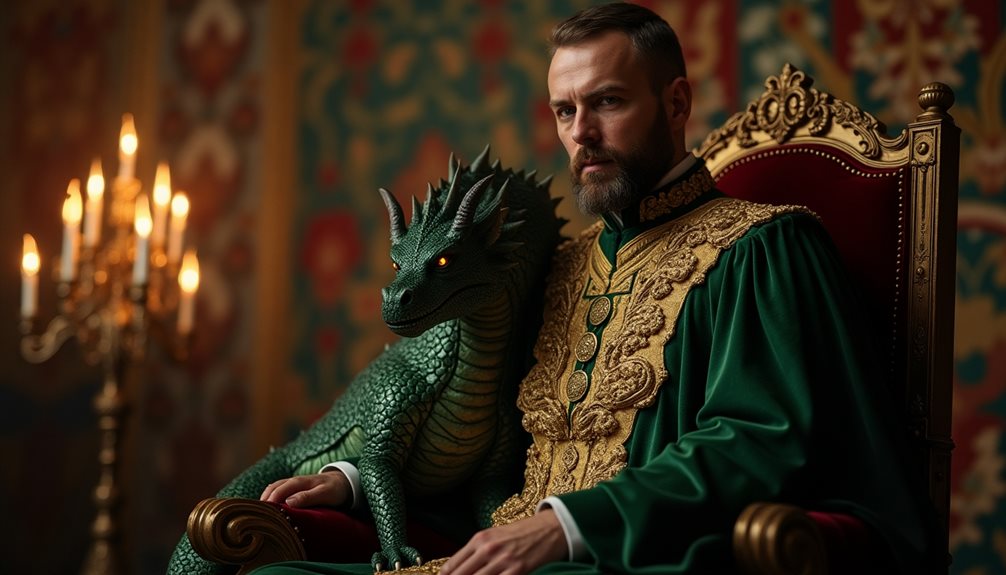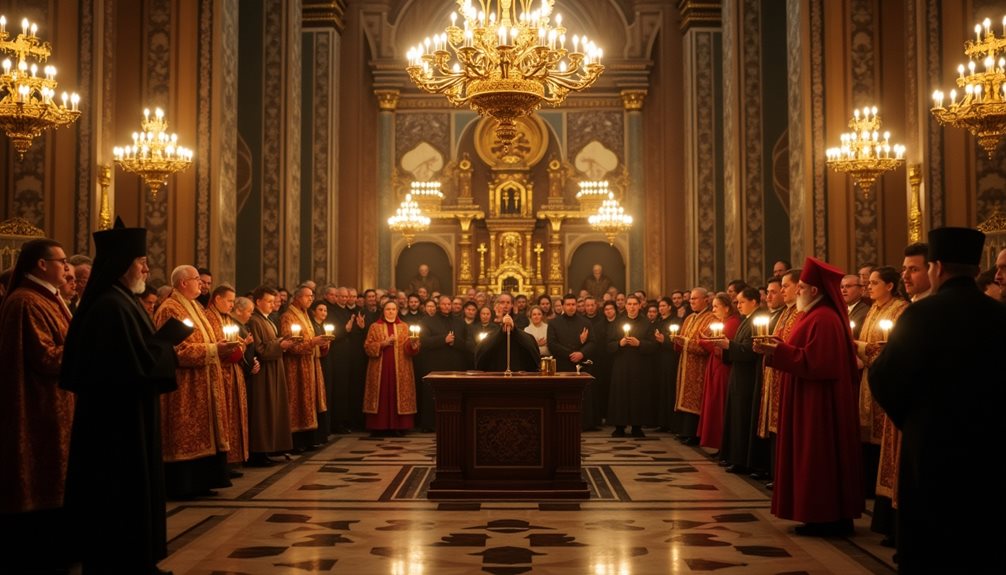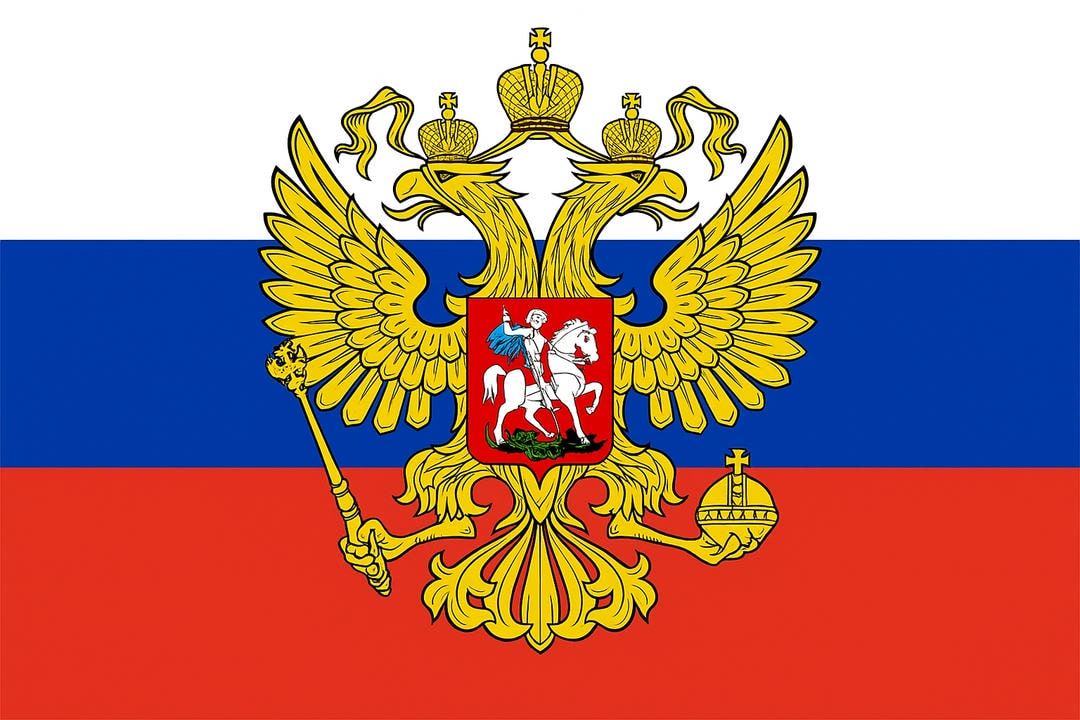When you explore Alexander Pushkin’s “The Golden Cockerel,” you’ll find a compelling blend of fantasy and social commentary that feels remarkably relevant. The tale of Tsar Dadon, who receives a magical cockerel to protect his kingdom, quickly turns into a cautionary story about the dangers of unchecked ambition and the price of greed. As you meet the cunning Queen of Shemakha and the mysterious Astrologer, the layers of Pushkin’s critique on leadership and wisdom become apparent. But what happens when the very gift meant to secure power becomes the catalyst for downfall?
Pushkin’s Masterpiece
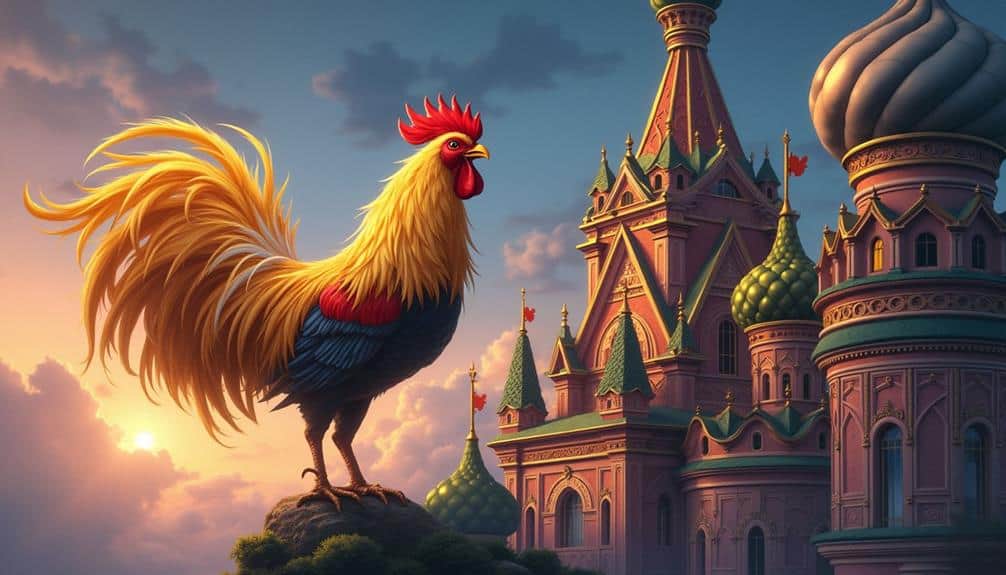
Pushkin’s mastery of storytelling shines brilliantly in “The Golden Cockerel,” a tale that melds fantasy with biting social commentary. When you immerse yourself in this work, you immediately notice Pushkin’s influence permeating through its layers. He uses literary symbolism to critique the excesses of power and the folly of human nature.
In “The Golden Cockerel,” Pushkin’s influence is evident in his ability to weave an engaging narrative while embedding profound messages. The story’s fantastical elements, such as the magical cockerel, act as symbols that represent broader societal issues. By doing so, Pushkin doesn’t just tell a story; he invites you to reflect on the complexities of leadership and morality.
You can’t overlook the depth of literary symbolism in this tale. The golden cockerel itself serves as a powerful metaphor for vigilance and the consequences of neglecting one’s duties. Pushkin’s clever use of this symbol challenges you to think about the balance between power and responsibility.
As you turn each page, you’re drawn into a world where every element has a deeper meaning, making “The Golden Cockerel” a masterpiece that resonates on multiple levels.
Characters Overview
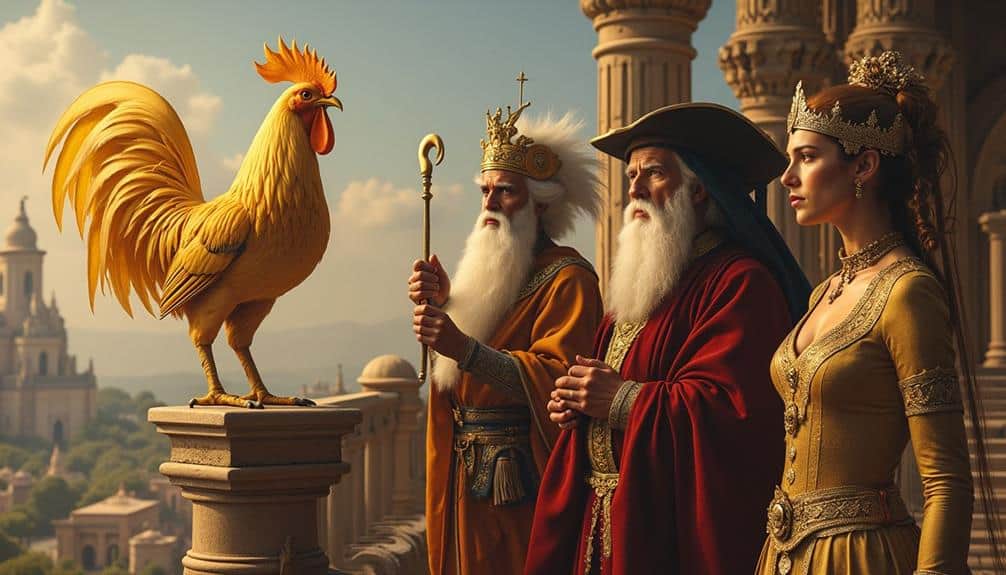
In exploring the profound themes of “The Golden Cockerel,” it’s also essential to understand the characters that bring this narrative to life. Each character plays a vital role, driven by distinct motivations that weave together to create a rich tapestry of moral and philosophical questions.
First, you have Tsar Dadon, whose desire for peace and security leads him to the astrologer. His quest for a solution reflects his deep fear and insecurity, epitomizing the burdens of leadership.
The astrologer, a mystical figure, offers the golden cockerel, a symbol of vigilance and protection. The cockerel itself isn’t just a bird but a powerful embodiment of foresight and warning, essential to the tale’s unfolding events.
Then there’s the Queen of Shemakha, whose beauty and allure captivate Tsar Dadon, driving him to act against his better judgment. Her character motivations are shrouded in mystery and seduction, adding layers of complexity to the story.
Understanding these characters and their motivations, alongside the cockerel symbolism, provides deeper insight into the narrative’s moral fabric. This intricate interplay is what makes “The Golden Cockerel” a timeless and thought-provoking masterpiece.
The Golden Cockerel’s Gift

The golden cockerel’s gift isn’t just a simple token; it’s a magical boon that greatly alters the course of Tsar Dadon’s reign. This enchanted bird perches high, vigilant and ever-watchful, its magical realism weaving through the very fabric of the kingdom.
It serves as a sentinel, warning of impending danger and granting the Tsar an almost supernatural foresight. With each cry of the cockerel, Dadon can anticipate threats, allowing him to make fateful choices that secure his rule and protect his people.
You can see the profound impact this gift has on the Tsar’s decisions. Every time the golden cockerel sounds an alarm, a pivotal moment unfolds, compelling Dadon to act swiftly and decisively.
The bird’s magical nature guarantees that its warnings are never false, instilling a sense of trust and dependency in the Tsar. This reliance on the cockerel’s guidance shapes his reign, steering him through crises with an almost uncanny accuracy.
However, the golden cockerel’s gift also introduces a layer of complexity. Each fateful choice Dadon makes, influenced by the bird’s cries, carries consequences that ripple through his kingdom, setting the stage for future events.
The King’s Greed
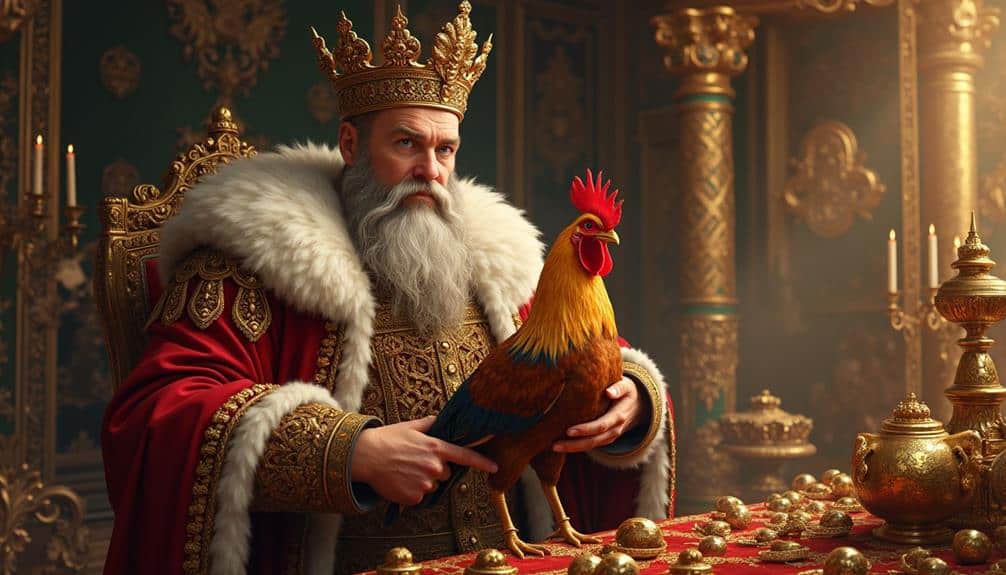
A sense of insatiable greed begins to overshadow Tsar Dadon’s reign as he grows increasingly dependent on the golden cockerel. His initial joy at receiving the cockerel’s protection quickly morphs into an obsession. He starts to desire more: more power, more control, and more assurances against any threat. The golden cockerel, perched high, becomes a symbol of the king’s desires, feeding his insatiable appetite for dominance.
You see, Tsar Dadon’s greed doesn’t stop with security. He begins to exploit his newfound sense of invincibility, pushing his domain’s boundaries and seeking to conquer neighboring lands. The cockerel’s warnings, once a simple safeguard, now fuel his relentless ambitions.
He becomes blind to the consequences of greed, ignoring the toll it takes on his people and kingdom. Resources are stretched thin, and the once-prosperous land starts to wither under the weight of his avarice.
The king’s unchecked desires set the stage for inevitable downfall. His fixation on the golden cockerel blinds him to the growing unrest among his subjects, and the stability of his reign begins to crumble. The consequences of greed, as you’ll soon see, are never far behind.
The Queen’s Arrival
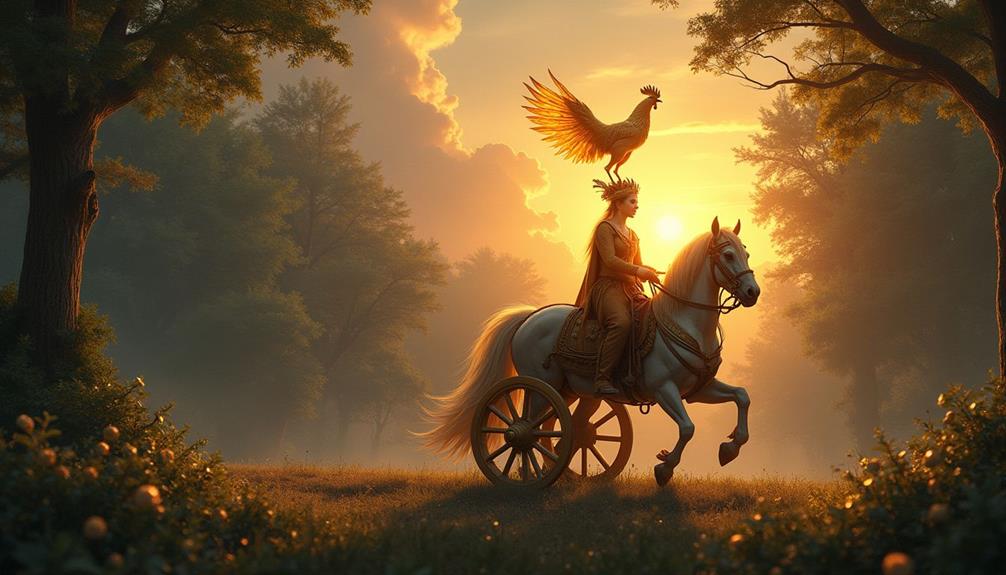
As Tsar Dadon’s greed consumes him, a new figure enters the scene: a mysterious and enchanting queen. You watch as the queen’s entrance captivates everyone present. Her royal demeanor exudes an air of authority and grace, making it impossible to look away.
She strides forward with a confidence that speaks of her noble lineage and unspoken power. The queen’s elegant attire, adorned with jewels that shimmer in the light, adds to her mystique.
The court falls silent, mesmerized by her presence. Tsar Dadon himself isn’t immune to her allure. You can see his eyes widen, a mixture of awe and desire flickering within them. He rises from his throne, stepping forward to greet her, his greed momentarily overshadowed by curiosity and fascination.
The queen meets his gaze, her expression unreadable, yet undeniably commanding. As she speaks, her voice is melodious yet firm, each word carrying weight. She addresses the court with a poise that only heightens her enigmatic charm.
You sense that her arrival will bring significant changes, stirring the already turbulent waters of Tsar Dadon’s reign. The queen’s entrance marks a pivotal moment, setting the stage for the unfolding events.
The Battle Unfolds
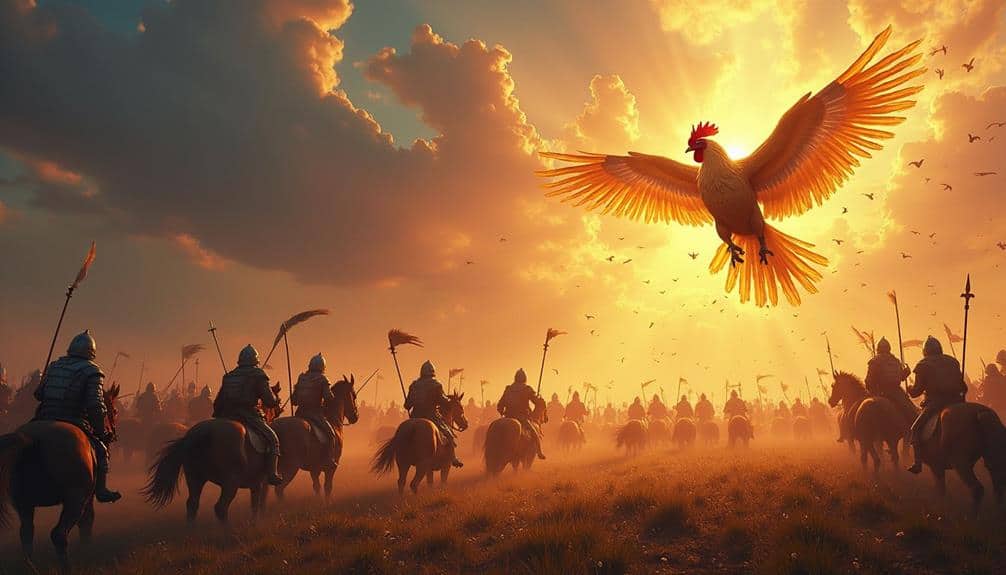
With the queen’s presence still lingering in the air, tension crackles as the battle begins to unfold. You can almost see the sparks fly as soldiers clash, swords ringing out in a cacophony of conflict.
It’s a scene painted with mythical symbolism, where each stroke of the sword seems to echo the ancient tales of valor and doom. The air is thick with the weight of fate’s irony, as heroes and villains alike find themselves ensnared in the same tragic dance.
You notice how the golden cockerel, perched high above, watches with an unblinking eye. It’s almost as if this mystical creature knows the outcome before it even begins. You can’t help but feel the heavy hand of destiny pressing down on the battlefield.
The soldiers, unaware of their roles in this grand tale, fight on with fervor and desperation. Amidst the chaos, you see the queen standing tall, her presence a stark contrast to the turmoil around her.
Every move she makes seems deliberate, as if she’s orchestrating the events to her advantage. The battle rages on, but deep down, you sense that this is more than just a clash of armies—it’s a struggle against the very threads of fate.
The Price of Folly
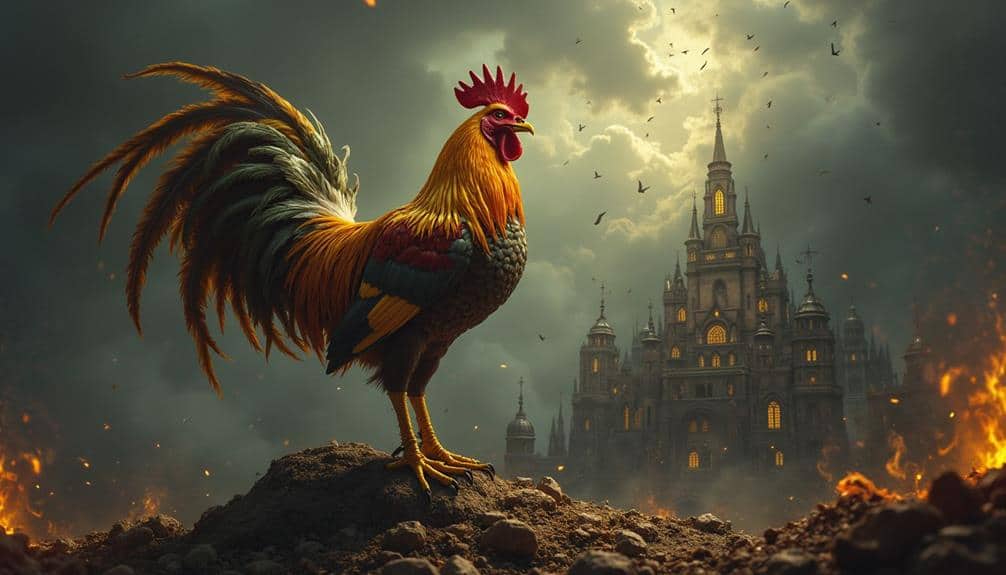
The clash of swords and the queen’s calculating presence fade into the background as the true cost of the battle begins to reveal itself. You start to realize that the king’s foolish decisions are leading to dire consequences. He relied too heavily on the Golden Cockerel, ignoring the wisdom and foresight that could’ve prevented this tragedy. His arrogance and complacency have brought ruin upon his kingdom.
Every rash choice made by the king now stands starkly against the backdrop of devastation. The once-vibrant kingdom is reduced to rubble, and the people are left to pick up the pieces. The consequences explored here aren’t just physical but also deeply emotional. Families are torn apart, trust is shattered, and the very essence of the domain’s spirit is compromised.
You can’t help but see the stark contrast between the king’s lofty ambitions and the grim reality that follows. His pursuit of power, driven by folly, has cost him everything.
The lesson is clear: wisdom and humility are essential in leadership. The price of folly is steep, and the kingdom’s suffering is a poignant reminder of the grave consequences of misguided actions.
Cultural Significance
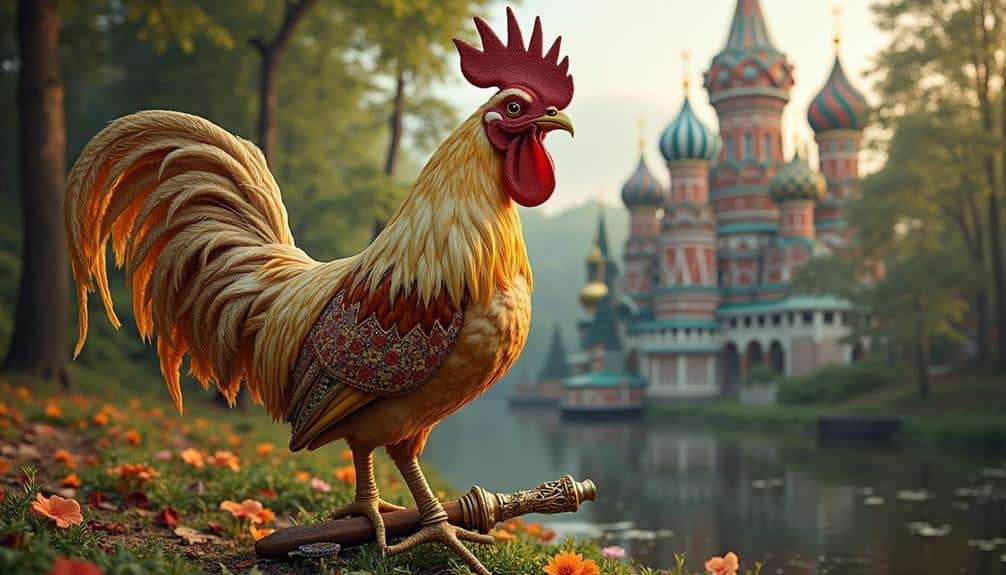
Many elements of “The Golden Cockerel” resonate deeply within Russian culture, reflecting both historical and societal values. You can see the rich folklore influences throughout the story. This tale, crafted by Alexander Pushkin, mirrors the complexities of Russian life and politics. The Golden Cockerel itself is a potent symbol, often interpreted as a harbinger of fate or a divine warning. Through this symbolism interpretation, you’re invited to look beyond the surface and explore the deeper messages Pushkin embedded in his narrative.
Consider the character of Tsar Dadon, whose actions and decisions reveal much about leadership and the consequences of ignoring wise counsel. In Russian folklore, leaders often face moral and ethical dilemmas, and Tsar Dadon is no exception. His downfall, brought about by his own arrogance and refusal to heed warnings, is a recurring theme in Russian stories.
The tale also emphasizes the importance of wisdom and humility. By understanding these folklore influences, you gain insight into the cultural fabric of Russia.
The Golden Cockerel” isn’t just a story; it’s a lens through which you can view the values and beliefs that have shaped Russian society over the centuries.

